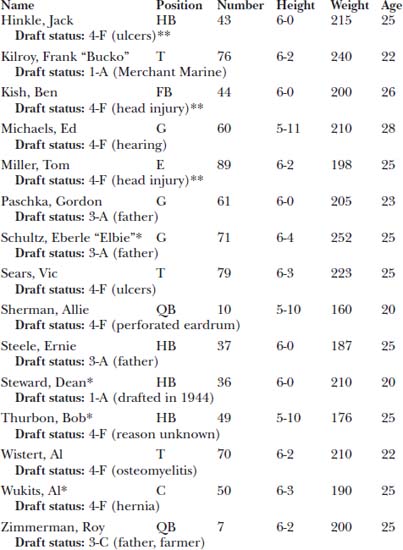Last Team Standing
Read Last Team Standing Online
Authors: Matthew Algeo



To Mom and Dad

Â
Â
Cataloging-in-Publication data for this book is available from the Library of Congress.
Grateful acknowledgment is made to David Meinert for permission to quote excerpts from the lyrics to “Candy Cigarette” by The Presidents of the United States of America.
Designed by Mark Corsey
Photo credits:
Jo Hanshaw (photo insert
page 3
, bottom photo)
Pro Football Hall of Fame/
WireImage.com
(photo insert
page 6
, both photos)
Temple University Libraries, Urban Archives, Philadelphia, PA (all other photos)
Copyright © 2006 by Matthew Algeo
All rights reserved.
Published by Chicago Review Press, Incorporated
814 North Franklin Street
Chicago, Illinois 60610
ISBN 978-1-61374-885-5
Printed in the United States of America
5 4 3 2 1

Roster: 1943 Phil-Pitt Steagles
S
EVEN:
Unfit for Military Service
Index

1943 Phil-Pitt Steagles
(Players who appeared in five or more games)


*Â Property of the Pittsburgh Steelers. (All others property of the Philadelphia Eagles.)
** Honorably discharged from military service for physical reasons.

I
T WASN'T SUPPOSED TO BE
a date that would live in infamy. That December day was just supposed to be Tuffy Leemans Day. After six seasons, Alphonse Emil Leemans, the New York Giants' burly halfback, was hanging up his spikes for good. Leemans was one of the toughest players in the National Football Leagueâhis nickname was not ironicâbut he was also one of the most popular players, among teammates, fans, even opponents. He was self-effacing. He had a good sense of humor. After practice he liked to unwind by helping his wife make candlewick rugs.
Leemans had been discovered by Wellington Mara, the teenaged son of Giants owner Tim Mara. While visiting Washington, D.C., in the fall of 1935, the younger Mara saw Leemans lead George Washington College against mighty Alabama. GW got throttled, 39-0, but it wasn't Leemans' fault. But for him, the
Washington Star
reported, “the Buff and Blue might have yielded even more points.” Especially impressive were Leemans' booming punts: twice he booted the ball more than 60 yardsâfrom his own end zone. So taken was Wellington that, upon his return to New York, he practically begged his father to sign Leemans. Wisely, the old man took his son's advice: the Giants made Leemans their second pick in the first NFL draft
the following spring. He proved to be more than just a great punter: He led the league in rushing his rookie season, carrying the ball for 830 yards. He also played excellent defense and returned kicks. He was an all-pro that seasonâand every season thereafter.
But now it was time for Leemans to move on to more lucrative pursuitsâhe had his eye on a duckpin bowling alley outside Washingtonâand the Giants wanted to give him a big sendoff before his final home game, at the Polo Grounds on December 7, 1941, against the Brooklyn Dodgers. (Professional football teams routinely “borrowed” the name of their local baseball franchise, much to posterity's confusion. There were even two different pro football teams called the New York Yankees in the 1940s.)
It was a perfect day for football, clear and cool, not a cloud in the sky. The massive stadium was packed with more than 55,000 fans, the league's biggest crowd of the season. Looking a little sheepish, Leemans accepted his parting gifts: a silver tray in the shape of a football and a small trophy, presented by Giants captain Mel Hein; a gold watch from his George Washington coach, Jim Pixlee; and $1,500 in defense bonds, presented by Jim Farley, New York State's Democratic boss, former Postmaster Generalâand ardent Giants fan.
Smiling, Leemans stepped up to the big microphone.
“Fans, teammates, my former coach, George Washington alumni, and”âsotto voceâ“the Brooklyn Dodgers.” The crowd roared with laughter. Leemans gave a brief, heartfelt speech in which, according to the
New York Times,
“he thanked every one for everything.”
The rest of the day was sure to be anticlimactic: With a record of eight wins and two losses, the Giants had already clinched the Eastern Division title for 1941. They would play the Western Division winner for the league championship in two weeks, so today they would play hardâbut not too hard.
With six wins and four losses, the Dodgers were playing for nothing but New York City bragging rights.
The game down in Washington that Sunday was meaningless, too. The Redskins were hosting the Philadelphia Eagles. Both teams had long been eliminated from playoff contention. The Redskins were ending their worst season since moving from Boston in 1937. The Eagles were guaranteed to finish with more losses than wins, just as they had every year since joining the league in 1933.
But the weather was spectacular in Washington, too, and the capital, weary of all the war talk and eager for outdoor diversions before the dreary Potomac winter took hold, turned out in force. Griffith Stadium, a dilapidated old battleship of a ballpark on Georgia Avenue NW, was nearly sold out. More than 27,000 fans filled the place, enabling the Redskins to set a new single-season attendance record: 194,450. Among the crowd were hundreds of servicemen, dapper in their long, double-breasted dress coats (soldiers in beige, sailors in dark blue), chatting, laughing, flirting with the girls working the concession stands, sipping hot cocoa or coffee (or maybe a little contraband whiskey). One of the servicemen at the game was a young naval officer named John F. Kennedy.